[ Read RFA coverage of this story in Burmese. Opens in new window ]
Officials are nearly done conducting a census in Myanmar ahead of planned elections next year, but observers say the data is inaccurate, as many residents have left the country, joined the armed opposition, or are in prison for opposing military rule.
The junta, which seized power in a 2021 coup, is holding a national census from Oct. 1-15 that will be used to draw up voter lists for an election they say will restore democratic rule – though opponents are doubtful.
Ethnic minority armies and rebel groups that have taken control of vast swaths of territory once held by the military oppose the election, saying it will be a sham and only serve to legitimize the junta’s control.
They have urged residents not to cooperate with the census-takers.
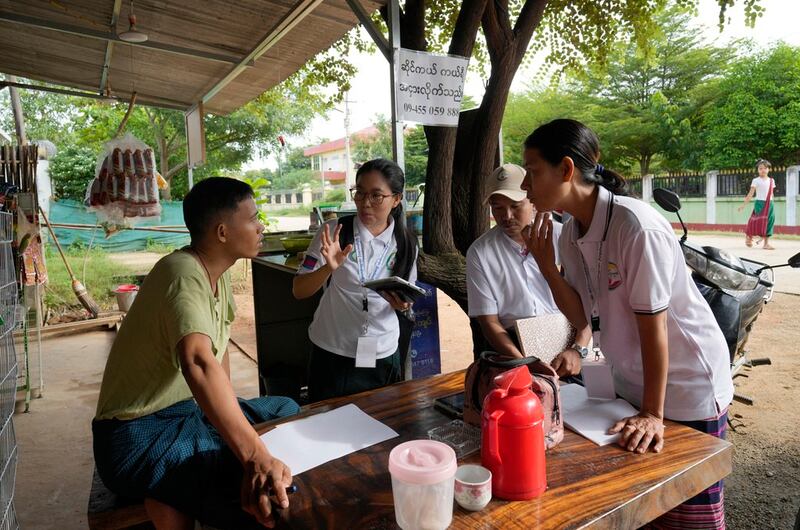
The military regime insists that its census will ensure an accurate voter list, but analysts told RFA that the data is incomplete due to the ongoing civil war.
According to the Institute for Strategy and Policy-Myanmar, armed conflict is underway in 233 of Myanmar’s 330 townships.
“Myanmar is engulfed in civil war and many of its people have fled or are taking shelter in the jungles and border areas. Additionally, some families dare not disclose truthful information, so the data is likely inaccurate,” said San Aung, who is observing the junta’s census efforts. “A census should only be taken in peacetime and in a political environment in which every citizen can participate.”
The junta has announced that the census is being carried out by about 40,000 officials in more than 100,000 village tracts, targeting an estimated population of 56 million living in 13 million households.
The last census in Myanmar was conducted in 2014, covering an estimated 98% of the country, except in areas of instability.
RELATED STORIES
[ Myanmar junta launches census after blasts in YangonOpens in new window ]
[ Myanmar’s junta presses ahead with census before proposed electionOpens in new window ]
[ EXPLAINED: Why does Myanmar’s junta want to hold elections?Opens in new window ]
[ Myanmar junta collecting workers’ data for censusOpens in new window ]
Bo Bo Oo, the vice chairman of Yangon region’s Sanchaung township for the deposed National League for Democracy party, told RFA that the data for this year’s census is unreliable.
“It is imperative to understand that a democratic election can only take place if the country is exercising democratic practices,” he said. “It’s ridiculous to hold an election while thousands of political prisoners are behind bars.”
Invasive questions
A census worker, who requested not to be named for security reasons, told RFA that the people do not want to take part in the census and are intentionally withholding personal information.
“No one wants to answer these questions and some are deliberately responding incorrectly – we know this is the situation and we don’t blame them,” he said. “People are worried that their answers will be used to arrest them. Probably 90% of people aren’t sharing true information.”
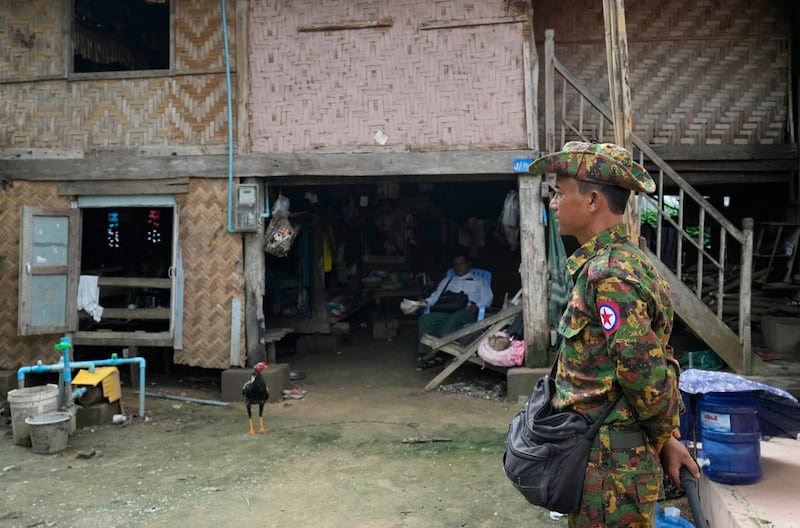
A resident of Mandalay region’s Pyigyitagon township said that the questions are “highly personal.”
“The questions should focus only on general information, such as the occupations of family members and their ages,” he said. “However, they are asking things like what kind of toilets we have and whether they are the local style or western style, with a flushing system.”
Other residents said they had been asked what kind of rice they eat, how many rooms are in their home, and whether any of their family members are living abroad.
According to Myanmar’s Population and Households Census Law of 2013, “information shall not be used for any other administrative purposes at an individual level except for those matters related to the Census.”
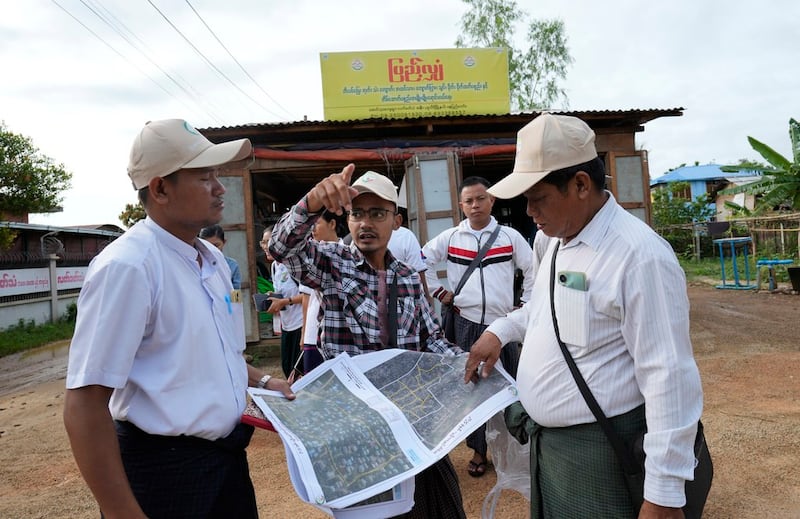
The junta also announced that authorities would not take any action or make arrests based on information obtained through the census, but few people believe that is true.
While Myanmar’s 2014 census consisted of only 41 questions, the current census requires that households answer 68 questions and organizations answer 18.
Seeking recognition from ASEAN
The census in Myanmar is underway as the junta sent a representative to the Association of Southeast Asian Nations, or ASEAN, summit currently being held in the Lao capital Vientiane, in what observers say is a bid to secure international recognition of its planned election.
Aung Kyaw Moe, the junta’s permanent secretary of the Ministry of Foreign Affairs, joined the summit despite Myanmar’s downgrade within the bloc due to the junta’s continued use of violence against the opposition.
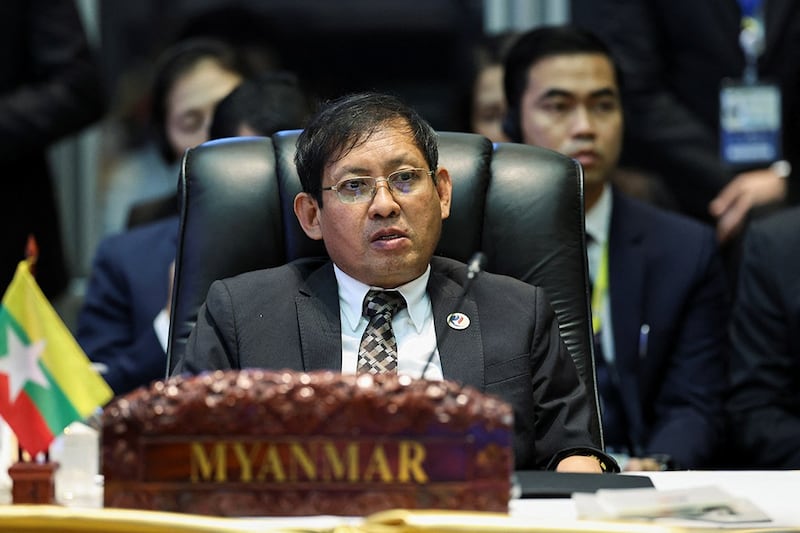
Kyaw Zaw, the spokesperson for the presidential office of Myanmar’s shadow National Unity Government, or NUG, suggested that the junta had sent a senior official to the summit after boycotting earlier meetings to “seek a way out of the current political crisis.”
“They didn’t join ASEAN meetings for more than three years because the junta chief and his foreign minister were banned from taking part,” he said. “All of a sudden they changed their approach because they are seeking a way to hold their fake and illegal election. To get out of the political crisis, the junta will lie to ASEAN.”
ASEAN has proposed a five-point peace plan for Myanmar, which the grouping calls a “consensus,” including a ceasefire and talks, but Myanmar’s generals have ignored it, battling on against a loose alliance of ethnic minority forces and pro-democracy fighters who have this year been making significant battlefield gains.
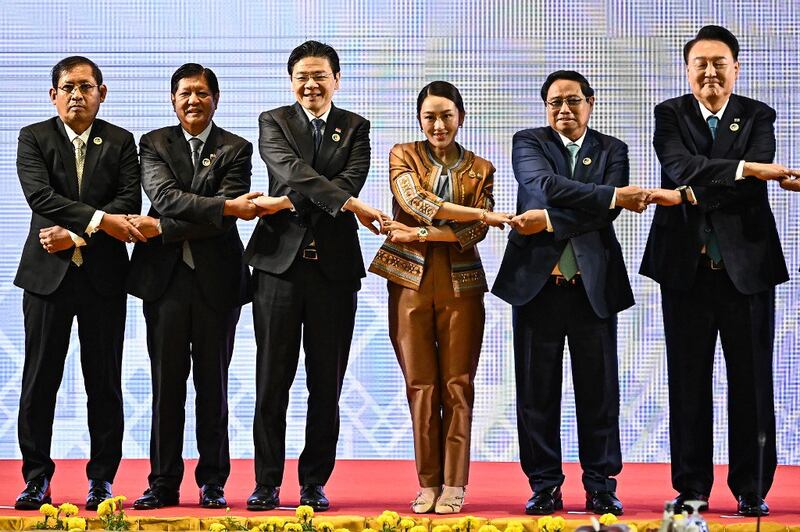
Sai Kyi Zin Soe, a political commentator, said that after more than three years, no one expects the ASEAN consensus on Myanmar will work.
“Amid this situation, the junta is preparing to hold elections to gain recognition from ASEAN,” he said.
Observers say that the longer ASEAN approaches the political crisis based on the interests of the bloc’s individual member countries, rather than prioritizing the wishes of the people of Myanmar, the longer the junta will remain in power.
Translated by Aung Naing. Edited by Joshua Lipes and Malcolm Foster.

